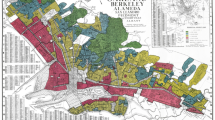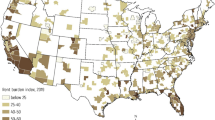Abstract
Although a growing body of research documents the association between homeownership and psychological well-being, it is unclear whether (a) time to homeownership is associated with life satisfaction and (b) housing affordability stress moderates the long-term psychological consequences of homeownership. The purpose of this study is to determine whether and how life satisfaction changes before and after homeownership, and whether this pattern differs depending on housing affordability stress. The data for this study came from 16497 adults who participated in 14 waves of the Korea Welfare Panel Study between 2007 and 2020 (132899 observations). Fixed effects regression models were used to estimate within-person trajectories of life satisfaction related to time to homeownership. To examine whether housing affordability stress mitigates psychological response to homeownership, this study included interaction effects between time to homeownership and housing affordability stress. Fixed effects estimates suggest that life satisfaction began to increase in the year preceding homeownership and reached its peak at the time of homeownership. This increased life satisfaction persisted through the third and subsequent years. The results of an interaction model revealed that the association between time to homeownership and life satisfaction exists only for those without housing affordability stress. Homeownership is a significant life event that can enhance psychological well-being. This study provides evidence of anticipatory and prolonged effects of homeownership. However, homeowners experiencing housing affordability stress may not reap the full psychological benefits.

Similar content being viewed by others
Data availability
The KoWEPS data are publicly available from their website (https://www.koweps.re.kr/)
Reference
OECD. (2019). Homeownership rate in OECD countries. https://www.oecd.org/housing/data/affordable-housing-database/
Amromin, G., Huang, J., & Sialm, C. (2007). The tradeoff between mortgage prepayments and tax-deferred retirement savings. Journal of Public Economics, 91(10), 2014–2040.
Baker, E., Bentley, R., & Mason, K. (2013). The Mental Health Effects of Housing Tenure: Causal or Compositional? Urban Studies, 50(2), 426–442.
Baker, E., Lester, L., Mason, K., & Bentley, R. (2020). Mental health and prolonged exposure to unaffordable housing: a longitudinal analysis. Social Psychiatry and Psychiatric Epidemiology, 55(6), 715–721.
Brüderl, J., & Ludwig, V. (2014). Fixed-Effects Panel Regression. The SAGE Handbook of Regression Analysis and Causal Inference (pp. 327–358). New York: SAGE Publications Ltd.
Cheung, F., & Lucas, R. E. (2014). Assessing the validity of single-item life satisfaction measures: Results from three large samples. Quality of Life Research, 23(10), 2809–2818.
Clark, A. E., & Diaz-Serrano, L. (2021). The Long-run Effects of Housing on Well-Being.
Dunn, J. R. (2020). Housing and healthy child development: Known and potential impacts of interventions. Annual Review of Public Health, 41(1), 381–396.
Ettman, C. K., Cohen, G. H., Vivier, P. M., & Galea, S. (2021). Savings, home ownership, and depression in low-income US adults. Social Psychiatry and Psychiatric Epidemiology, 56(7), 1211–1219.
Fafard St-Germain, A.-A., & Tarasuk, V. (2020). Homeownership status and risk of food insecurity: examining the role of housing debt, housing expenditure and housing asset using a cross-sectional population-based survey of Canadian households. International Journal for Equity in Health, 19(1), 5.
Ghimire, R. (2021). Homeownership and community involvement: Results from the 2019 metro Atlanta speaks survey. Housing Policy Debate, 31(6), 837–861.
Headey, B. (2006). Subjective well-being: revisions to dynamic equilibrium theory using national panel data and panel regression methods. Social Indicators Research, 79(3), 369–403.
Herbers, D. J., & Mulder, C. H. (2017). Housing and subjective well-being of older adults in Europe. Journal of Housing and the Built Environment, 32(3), 533–558.
Hu, F. (2013). Homeownership and Subjective Wellbeing in Urban China: Does Owning a House Make You Happier? Social Indicators Research, 110(3), 951–971.
Hu, M., & Ye, W. (2020). Home Ownership and Subjective Wellbeing: A Perspective from Ownership Heterogeneity. Journal of Happiness Studies, 21(3), 1059–1079.
Hulchanski, J. D. (1995). The concept of housing affordability: Six contemporary uses of the housing expenditure-to-income ratio. Housing Studies, 10(4), 471–491.
Kavanagh, A. M., Aitken, Z., Baker, E., LaMontagne, A. D., Milner, A., & Bentley, R. (2016). Housing tenure and affordability and mental health following disability acquisition in adulthood. Social Science & Medicine, 151, 225–232.
Keene, D. E., Cowan, S. K., & Baker, A. C. (2015). “When You’re in a Crisis Like That, You Don’t Want People to Know”: Mortgage Strain, Stigma, and Mental Health. American Journal of Public Health, 105(5), 1008–1012.
Kim, J. (2013). Housepoor Problem: Diagnosis and Remedies. The Korea Spatial Planning Review, 77, 155–174.
Kim, S. H., Kim, H., Joo, H. J., Jeong, S. H., Park, E.-C., & Jang, S.-I. (2021). Impact of changes in housing tenure and affordability status on depressive symptoms: Evidence from a longitudinal study. Journal of Affective Disorders, 295, 40–49.
Kirkpatrick, S. I., & Tarasuk, V. (2007). Adequacy of food spending is related to housing expenditures among lower-income Canadian households. Public Health Nutrition, 10(12), 1373–1464.
Lee, T. H., Park, E. C., Kim, W., Kim, J., Shin, J., & Kim, T. H. (2016). Depressive symptoms of house-poor persons: Korean panel data evidence. International Journal of Social Psychiatry, 62(6), 569–577.
Leung, L. A., & Lau, C. (2017). Effect of mortgage indebtedness on health of U.S. homeowners. Review of Economics of the Household, 15(1), 239–264.
Luhmann, M., Hofmann, W., Eid, M., & Lucas, R. E. (2012). Subjective well-being and adaptation to life events: A meta-analysis. Journal of Personality and Social Psychology, 102(3), 592–615.
Macintyre, S., Ellaway, A., Der, G., Ford, G., & Hunt, K. (1998). Do housing tenure and car access predict health because they are simply markers of income or self Esteem? A Scottish study. Journal of Epidemiology and Community Health, 52(10), 657–664.
Manturuk, K. R. (2012). Urban homeownership and mental health: Mediating effect of perceived sense of control. City & Community, 11(4), 409–430.
Morris, E. A. (2018). Is a Fixer-upper actually a downer? Homeownership, gender, work on the home, and subjective well-being. Housing Policy Debate, 28(3), 342–367.
Odermatt, R., & Stutzer, A. (2020). Does the dream of home ownership rest upon biased beliefs? A test based on predicted and realized life satisfaction. Journal of Happiness Studies., 102, 1–33.
OECD. (2018). Housing Dynamics in Korea: Building Inclusive and Smart Cities. OECD.
Park, G.-R., Park, H., & Kim, J. (2021). Homeownership and psychological resources among older adults: do gender and mortgage status moderate homeownership effects? Journal of Aging and Health, 898, 264–321.
Rohe, W. M., & Stegman, M. A. (1994). The effects of homeownership: on the self-esteem, perceived control and life satisfaction of low-income people. Journal of the American Planning Association, 60(2), 173–184.
Ronald, R., & Jin, M.-Y. (2010). Homeownership in South Korea: Examining sector underdevelopment. Urban Studies, 47(11), 2367–2388.
Seo, B.-K., & Park, G.-R. (2021). Housing, living arrangements and mental health of young adults in independent living. International Journal of Environmental Research and Public Health, 18(10), 5250.
Stone, M. E. (2006). What is housing affordability? The case for the residual income approach. Housing Policy Debate, 17(1), 151–184.
Stotz, O. (2019). The perception of homeownership utility: Short-term and long-term effects. Journal of Housing Economics, 44, 99–111.
Vaisey, S., & Miles, A. (2017). What you can—and can’t—do with three-wave panel data. Sociological Methods & Research, 46(1), 44–67.
van Praag, B., Frijters, P., & Ferrer-i-Carbonell, A. (2003). The anatomy of subjective well-being. Journal of Economic Behavior & Organization, 51(1), 29–49. https://econpapers.repec.org/RePEc:eee:jeborg:v:51:y:2003:i:1:p:29-49
Will, S., & Renz, T. (2022). In debt but still happy? Examining the relationship between homeownership and life satisfaction. http://hdl.handle.net/10419/251792
Yu, H. J., & Lee, S. (2010). Government housing policies and housing market instability in Korea. Habitat International, 34(2), 145–153.
Zumbro, T. (2014). The Relationship Between Homeownership and Life Satisfaction in Germany. Housing Studies, 29(3), 319–338.
Acknowledgments
Jinho Kim and Gum-Ryeong Park contributed equally to the research. The authors received no financial support for the research, authorship, and/or publication of this article.
Funding
The authors received no financial support for the research, authorship, and/or publication of this article.
Author information
Authors and Affiliations
Corresponding author
Ethics declarations
Conflict of interest
The authors declare that they have no conflict of interest.
Additional information
Publisher's Note
Springer Nature remains neutral with regard to jurisdictional claims in published maps and institutional affiliations.
Supplementary Information
Below is the link to the electronic supplementary material.
Rights and permissions
Springer Nature or its licensor (e.g. a society or other partner) holds exclusive rights to this article under a publishing agreement with the author(s) or other rightsholder(s); author self-archiving of the accepted manuscript version of this article is solely governed by the terms of such publishing agreement and applicable law.
About this article
Cite this article
Park, GR., Kim, J. Trajectories of Life Satisfaction Before and After Homeownership: The Role of Housing Affordability Stress. J Happiness Stud 24, 397–408 (2023). https://doi.org/10.1007/s10902-022-00601-7
Accepted:
Published:
Issue Date:
DOI: https://doi.org/10.1007/s10902-022-00601-7




